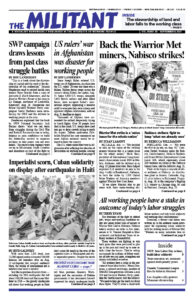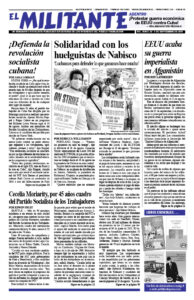Since Joseph Biden ordered U.S. troops out of Afghanistan, an admission the U.S. rulers’ 20-year war there was a failure, Taliban forces swept across the country taking Kabul, the capital, Aug. 15. Some 5,800 U.S. troops, alongside 1,000 British soldiers and other allied forces, have occupied Kabul’s international airport, organizing a massive airlift to evacuate their own citizens and approved Afghan collaborators, with an Aug. 31 deadline to depart.
Thousands of Afghans have surrounded the airfield desperately trying to board flights. Over 20 people have died in the crush. U.S. troops have used tear gas to deter crowds trying to reach the airport. Taliban spokesman Zabihullah Mujahid has now announced no more Afghan nationals would be allowed to leave the country.
The U.S. rulers ended their war in Afghanistan after inflicting two decades of devastation on working people, costing tens of thousands of lives. Washington’s occupation blocked action by working people to advance their own class interests; propped up governments that defended landlord and capitalist exploitation; and made it harder for working people to fight the Taliban and other reactionary forces.
The Taliban sent hundreds of its fighters to the outskirts of the Panjshir Valley Aug. 23, vowing to crush resistance that erupted against its rule.
The reactionary Islamist group enforced stifling political and cultural conditions on working people when it previously ruled the country. These included imposition of Sharia law, public executions, preventing workers from organizing, and stopping women from working and girls from going to school.
After Kabul fell, Mujahid announced the Taliban won’t seek revenge against its opponents and wants to form an “inclusive government.” It has held talks with senior bourgeois opposition figures, including former President Hamid Karzai.
In the wake of its military pullout, Washington is using its vast economic weight to pressure the Taliban, announcing it is preventing the export of U.S. dollars to Kabul. The former Afghan government was heavily dependent on an inflow of dollars to prop up the country’s currency.
The Taliban inherits a capitalist economy three times larger than when it was in power 20 years ago. Especially in the countryside, it is one still largely dependent on the drug trade. Less than half the population has access to sanitation, and the country remains one of the world’s poorest. Some 3.5 million people are now internally displaced by the war.
Protests against Taliban rule
Protesters in a number of cities raised the Afghan national flag Aug. 19, Afghanistan’s independence day, which celebrates the defeat of British imperial forces in 1919. Some tore down white Taliban banners. Mohammed Salim told Reuters that he saw several people “killed and injured in the stampede and firing by the Taliban,” when anti-Taliban protesters took to the streets in Asadabad.
In Kabul about 200 people gathered before the action was broken up by the Taliban. Protests also took place in other provinces.
Nine men were tortured and murdered by Taliban fighters in a village in Ghazni province in early July, according to Amnesty International. They belonged to the Hazara, an ethnic group who practice a Shiite version of Islam and speak a Persian dialect. The Hazara have long been persecuted in both Afghanistan and Pakistan.
The rulers in Beijing, Tehran and Islamabad, as well as in Moscow, are seeking to extend their influence in Afghanistan. Russian Foreign Minister Sergei Lavrov said the governments of Russia, China and Pakistan are offering to serve as mediators alongside Washington with the aim of reconciling the Taliban and its political opponents.
Beijing wants stability in Afghanistan for its investments and minerals extraction, including lithium and rare earths used in the manufacture of computers.
U.S. imperialism lost the war
The U.S. rulers had long ceased trying to win their war in Afghanistan before President Joseph Biden announced the U.S. troop withdrawal. The disorganized military flight has provoked bitter recriminations from within both the two main U.S. capitalist parties.
Washington’s retreat undermines the U.S. rulers’ standing at the head of the world imperialist order, boosts its rivals and makes it harder to demand governments that stand in its way submit to its dictates.
As the Socialist Workers Party resolution “Their Transformation and Ours” published in New International no. 12 explains, the U.S. rulers’ bombardment of Afghanistan and overturn of the Taliban in 2001 was aimed at “persuading” governments across the region “that continuing to get crosswise with Washington is not only against their class interests but contrary over an extended period to their own survival.”
Despite their retreat, the U.S. rulers remain by far the world’s dominant imperialist power with tens of thousands of military forces at bases across the Middle East and massive deployments of bombers, drones, warships, artillery and troops around the globe.

